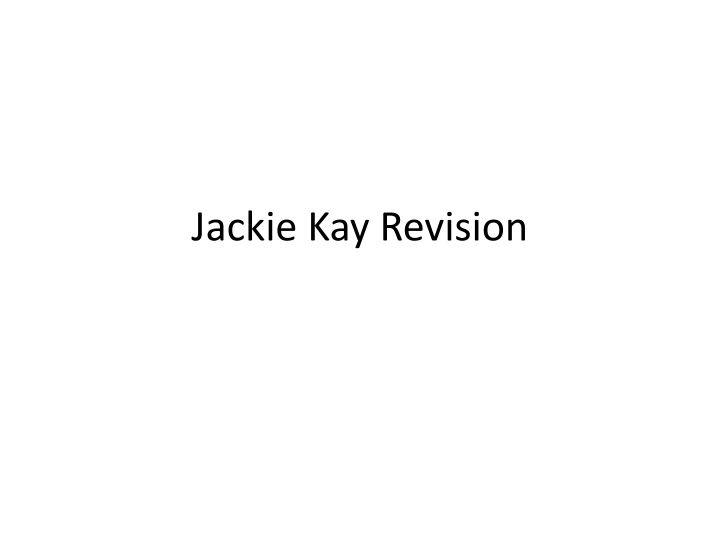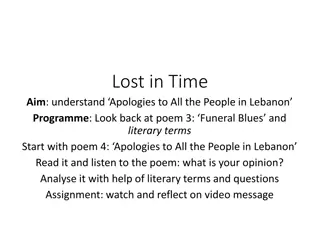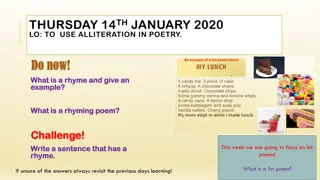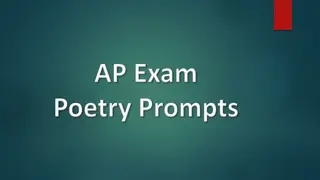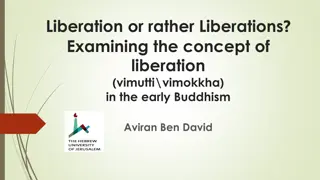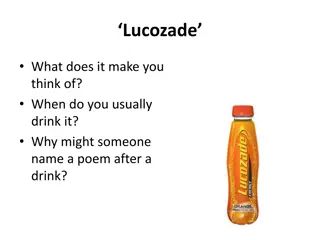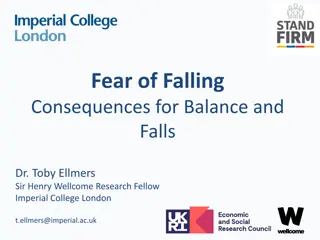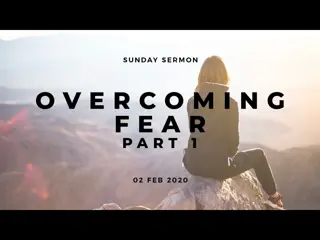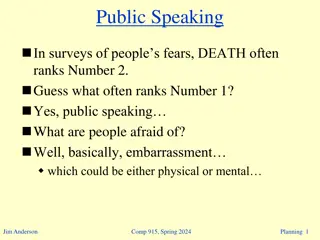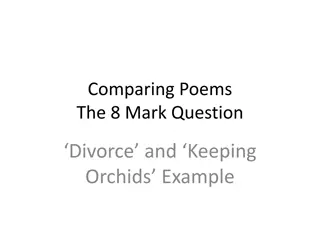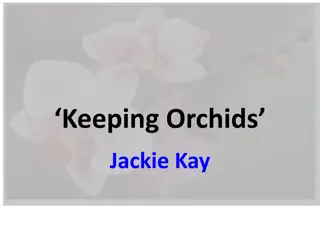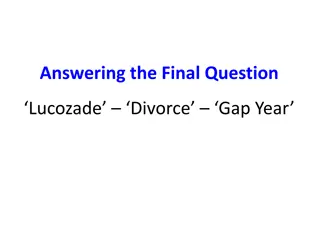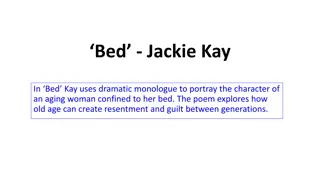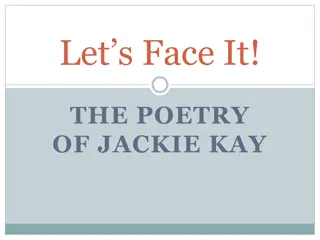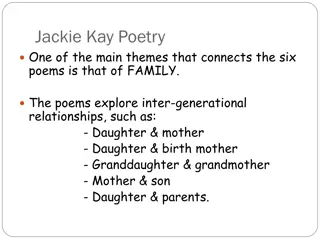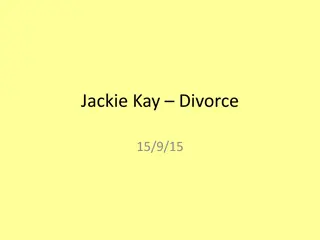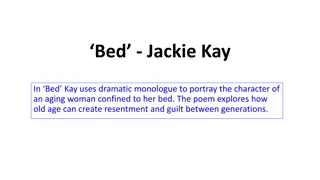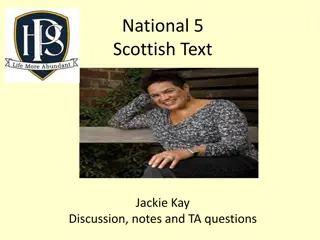Analysis of Jackie Kay's Poems on Fear, Liberation, and Everyday Situations
In this analysis, we delve into Jackie Kay's poems "Lucozade" and "Lucozade 1" to explore themes of fear, liberation, and transforming ordinary events into thought-provoking moments. Kay's evocative language captures the speaker's anxiety about losing their mother, the mother's disdain for hospital norms, and her desire for indulgence amidst confinement. Through poignant imagery and character depth, Kay elevates mundane situations into poignant reflections on life's complexities.
Download Presentation

Please find below an Image/Link to download the presentation.
The content on the website is provided AS IS for your information and personal use only. It may not be sold, licensed, or shared on other websites without obtaining consent from the author.If you encounter any issues during the download, it is possible that the publisher has removed the file from their server.
You are allowed to download the files provided on this website for personal or commercial use, subject to the condition that they are used lawfully. All files are the property of their respective owners.
The content on the website is provided AS IS for your information and personal use only. It may not be sold, licensed, or shared on other websites without obtaining consent from the author.
E N D
Presentation Transcript
Lucozade Divorce Bed Gap Year My Grandmother s Houses Keeping Orchids
Lucozade 1. Explain how the speaker s sense of fear is conveyed in lines 1-4. (4 MARKS) 2. What is the mother s attitude towards being in hospital in lines 9-12? (4 MARKS) 3. What does the mother want to change about being in hospital in lines 13-20? (2 MARKS) 4. Show how the mother is made to seem liberated in the final stanza. (2 MARKS) 5. In this poem, Kay takes an everyday, ordinary situation and transforms it into something special and thought- provoking. Choose at least one other poem by her in which she does the same thing and explain how she adds significance to an ordinary event. (8 MARKS)
Explain how the speaker s sense of fear is conveyed in lines 1-4. (4) My mum is on a high bed next to sad chrysanthemums. Don t bring flowers, they only wilt and die. I am scared my mum is going to die on the bed next to the sad chrysanthemums. My mum is on a high bed next to sad chrysanthemums. (1) Thistransferred epithet tells us the the speaker is sad, not the flowers, because of her fears for her mother s health. (1) I am scared my mum is going to die (1) This simple confessional statement connects the mother to the flowers and reflects the speaker s age / fear. (1) they only wilt and die (1) This suggests a sense of inevitability about her fears. The flowers have become the image of death / fading / loss of vitality she is scared that, just as cut flowers inevitably die, so will her mother. (1)
What is the mother s attitude towards being in hospital in lines 9-12? (4) The whole day was a blur, a swarm of eyes. Those doctors with their white lies. Did you think you could cheer me up with a Woman s Own? Don t bring magazines, too much about size. The whole day was a blur, a swarm of eyes. (1) She is feeling objectified, gawped at, irritated by all the attention (1) white lies (1) This recalls the doctors white coats and reflects that the mother is frustrated and feels her doctors are dealing in half truths / medical euphemism and not being honest with her. (1) Again reflects the mother s rejection of the traditional approach to illness / death. (1) Did you think you could cheer me up with a Woman s Own? Don t bring magazines, too much about size. (1) cheer me up suggests that she is feeling down about being in the hospital. Magazines, traditionally brought by hospital visitors, cannot bring her happiness and shift her low mood. (1)
What does the mother want to change about being in hospital in lines 13-20? (2) My mum wakes up, groggy and low. What I want to know, she says, is this: where s the big brandy, the generous gin, the Bloody Mary, the biscuit tin, the chocolate gingers, the dirty big meringue? I am sixteen; I ve never tasted a Bloody Mary. Tell your father to bring a luxury, says she. Grapes have no imagination, they re just green. Tell him: stop the neighbours coming. where s the big brandy, the generous gin, the Bloody Mary, the biscuit tin, the chocolate gingers, the dirty big meringue? (1) The mother rejects the traditional symbols of illness (grapes, flowers, magazines, lucozade) and instead lists the several luxuries which she would rather have, showing the grandiose indulgence, recklessness, extravagance and naughtiness which she would rather indulge in and the life-affirming nature of her request. (1)
What does the mother want to change about being in hospital in lines 13-20? (2) My mum wakes up, groggy and low. What I want to know, she says, is this: where s the big brandy, the generous gin, the Bloody Mary, the biscuit tin, the chocolate gingers, the dirty big meringue? I am sixteen; I ve never tasted a Bloody Mary. Tell your father to bring a luxury, says she. Grapes have no imagination, they re just green. Tell him: stop the neighbours coming. Tell him: stop the neighbours coming. (1) She is either too ill / close to death to receive visitors or simply sick of the swarm of eyes and wants to spend her final days on her own terms with only those close to her. (1)
Show how the mother is made to seem liberated in the final stanza. (2) My mother, on her high hospital bed, waves back. Her face is light and radiant, dandelion hours. Her sheets billow and whirl. She is beautiful. Next to her the empty table is divine. My mother, on her high hospital bed, waves back. (1) Mother waving back suggests that her energy has returned. She has been revived, not by Lucozade, but by its removal and through her rejection of the expected role of victim / invalid. (1) Her face is light and radiant (1) This is optimistic and there is a sense of her being unburdened (compared to the daughter s burden as she carries away the trappings of illness). Both words suggest she is feeling positive and uplifted. (1) Her sheets billow and whirl. She is beautiful. (1) This has angelic connotations, emphasised by the soft consonants and vowels. This simple statement of beauty suggests a revelation for the speaker her mother is free from her previous low mood. (1)
Show how the mother is made to seem liberated in the final stanza. (2) My mother, on her high hospital bed, waves back. Her face is light and radiant, dandelion hours. Her sheets billow and whirl. She is beautiful. Next to her the empty table is divine. Next to her the empty table is divine (1) This continues the image of heaven /angelic transcendence (compared with the negative tone of death in the first stanza). This is a transferred epithet the mother is divine, not the table. (1)
In this poem, Kay takes an everyday, ordinary situation and transforms it into something special and thought-provoking. Choose at least one other poem by her in which she does the same thing and explain how she adds significance to an ordinary event. (8) Answering The Final Question Summary 1. Commonality: refer to another poem or poems and say what it has / they have in common / in contrast with the given poem. (2) 2. Extract: refer to the extract / poem you have been given in relation to the question. (2) 3. Other 1: refer to a second poem / extract in relation to the question. (2) 4. Other 2: repeat stage 3 for the second or a third poem. (2)
Possible points of comparison? Other poems which have everyday, ordinary situations which are transformed into something special and thought-provoking ?
Gap Year - portrays the close bond of a mother and son. Kay is waiting for her son to return from his gap year travels. It leads to reflections on her feelings about his childhood and newfound independence. The poem explores themes of motherhood, closeness and distance, and the passage of time. Possible Quotes: I have a son out in the big, wide world. theme pride in her son, close relationship. Sentence Structure: proud declarative sentence. I remember your Moses basket before you were born. theme closeness, longed for baby, contrast to staring at empty bed now. I am wearing your large black slippers, flip-flopping into your bedroom. - theme: missing her son, word choice: onomatopoeia emphasising her sadness. I feel like a home-alone mother. - word choice: pun on home-alone, role reversal, usually a child. My heart soars like the birds in your bright blue skies. imagery simile: image of pride and joy. Seeing you, shy, smiling, on the webcam reminds me / Of the second scan at twenty weeks. theme: comparison between past and present. All the lights have gone out in the hall. imagery: symbol of her life being empty without him. Now you are eighteen, / Six foot two, away, away in Costa Rica, Peru, Bolivia. sentence structure: repetition, emphasises distance, list of countries empahsises how far he has travelled away from his mother.
Keeping Orchids meeting your mother for a coffee is an everyday activity, but this is her first meeting with her birth mother. The meeting is emotionally complicated. The mother is very reticent and Kay finds it hard to understand her and to process her own feelings and responses to the situation. She uses the orchid to explore emotion stirred up by her past and this woman. Possible Quotes: The orchids my mother gave me when we first met theme: shock as we realise it is first time speaker has met natural mother. Even her voice rushes / through a tunnel the other way from home. theme: distance between them is not just physical but emotional. I have rearranged the upset orchids with troubled hands. imagery, transferred epithet, word choice: it is the speaker who feels this way. Boiling water makes flowers live longer. So does / Cutting the stems with a sharp knife. imagery (a symbol for the process of adoption: painful but for the greater good) sentence structure (enjambment, time passing quickly) A bag of tricks. imagery(metaphor suggesting mother s secrecy) sentence structure (short and blunt suggesting anger towards mother).
Divorce 1. Summarise the ways in which the speaker s parents are an irritation to her. (4 MARKS) 2. How is imagery used to create an idea of the perfect parents in lines 16-24? (4 MARKS) 3. How does the language in lines 24-28 show the speaker s anger? (4 MARKS) 4. Choose at least one other poem by Kay that explores the theme of family relationships. Show how the poet explores the theme in Divorce and your chosen poem. (8 MARKS)
Summarise the ways in which the speaker s parents are an irritation to her. (4) I did not promise to stay with you till death do us part, or anything like that, so part I must, and quickly. There are things I cannot suffer any longer: Mother, you never, ever said a kind word or a thank-you for all the tedious chores I have done; Father, your breath smells like a camel s and gives me the hump; all you ever say is: Are you off in the cream puff, Lady Muck? In this day and age? I would be better off in an orphanage. Quote (1) She feels her mother is ungrateful and indifferent towards her or does not love her properly. The build up here of never, ever suggests that she can t remember it ever happening. (1) Quote (1) She mocks her father s bad breath and his mocking of her. It is clear that she thinks her father s nickname for her is derogatory and it upsets her. (1)
How is imagery used to create an idea of the perfect parents in lines 16-24? (4) There are parents in the world whose faces turn up to the light who speak in the soft murmur of rivers and never shout. There are parents who stroke their children s cheeks in the dead of night and sing in the colourful voices of rainbows, red to blue. These parents are not you. I never chose you. Quote (1) The use of light makes us think about goodness and sunshine and makes these parents sound happy. (1) Quote (1) This compares the way these parents speak to the sound of rivers. These rivers are soft and calm and soothing. The speaker clearly thinks these parents are lovely as they never raise their voices and are calm all the time. (1) Quote (1) This sounds like when they are singing happy colours come out of their mouths, making them seem joyous and magical. You could imagine having a wonderful time with these parents.
How does the language in lines 24- 28 show the speaker s anger? (4) These parents are not you. I never chose you. You are rough and wild, I don t want to be your child. All you do is shout and that s not right. I will file for divorce in the morning at first light. Quote (1) The short, declarative statements convey childishness and slight petulance / stroppiness. (1) Quote (1) She describes her parents as being like uncivilised animals and always shouting, showing her anger towards them. This is ironic as the speaker is the one coming across as rough and wild. (1) Quote (1) The accusative tone suggests it might be being shouted at the parents. (1) Quote (1) This suggests an unshakeable certainty about right and wrong; she sees her parents behaviour as wrong but, ironically, we can imagine her shouting this at her parents. (1)
Choose at least one other poem by Kay that explores the theme of family relationships. Show how the poet explores the theme in Divorce and your chosen poem. 8 Summary how to answer the 8 mark question 1. Commonality: refer to another poem or poems and say what it has / they have in common / in contrast with the given poem. (2) 2. Extract: refer to the extract / poem you have been given in relation to the question. (2) 3. Other 1: refer to a second poem / extract in relation to the question. (2) 4. Other 2: repeat stage 3 for the second or a third poem. (2)
5. With close textual reference, show how the theme of family relationships is explored in this poem, and in at least one other poem by Jackie Kay. 8 Commonality - Family Relationships: Divorce Parent / child relationship Lucozade Mother / daughter relationship Lucozade is written from the point of view of a teenager, probably a girl, who is visiting her sick mother in hospital and is worried about what is going to happen to her. Divorce is written from the point of view of a teenage girl who feels that her parents are cruel to her and don t appreciate her and so she wishes to divorce them.
Quotes related to Family Relationships: Divorce Lucozade Mother, you never, ever said / a kind word / or a thank-you for all the tedious chores I have done; Father, your breath / smells like a camel s and gives me the hump; I would be better off in an orphanage. I want a divorce. I don t want to be your child. All you do is shout / and that s not right. I am scared my mum is going to die / on the bed next to the sad chrysanthemums. I turn round, wave with her flowers. /My mother, on her high hospital bed, waves back. / Her face is light and radiant, dandelion hours. / Her sheets billow and whirl. She is beautiful. I carry the orange nostalgia home singing an old song. 1 Quote needed 2 Quotes needed
Extract - In Divorce, the melodramatic statement I would be better off in an orphanage shows that the girl wants to completely reject her parents, the divorce of the title. This reminds us of the kind of thing teenagers say when fighting with their parents and the reader can imagine her stomping off, slamming the door after her. Other 1 - In contrast, the speaker in Lucozade seems to be close to her mother and is worried that she is going to lose her: I am scared my mum is going to die / on the bed next to the sad chrysanthemums. This transferred epithet shows us the speaker s sadness about her mother s illness and links the mother to the flowers: she is scared that her mother will wilt and die , just like the flowers. Other 2 - Towards the end of the poem, the daughter removes, at her mother s request, the stereotypical objects associated with illness, like the lucozade of the title, and when her mother waves her goodbye Her face is light and radiant, dandelion hours. The end of the poem is far more optimistic than the start and we get a sense of the mother being unburdened by the daughter taking away the objects. The metaphor dandelion hours continues this sense of lightness and beauty, but it also suggests delicate fragility. The mother may have little time remaining, but is facing death on her own terms, with her daughter s help, showing the close bond between them.
Commonality - Divorce is written from the point of view of a teenage girl who feels that her parents are cruel to her and don t appreciate her and so she wishes to divorce them. Lucozade is written from the point of view of a teenager, probably a girl, who is visiting her sick mother in hospital and is worried about what is going to happen to her. Extract - In Divorce , the melodramatic statement I would be better off in an orphanage shows that the girl wants to completely reject her parents, the divorce of the title. This reminds us of the kind of thing teenagers say when fighting with their parents and the reader can imagine her stomping off, slamming the door after her. Other 1 - In contrast, the speaker in Lucozade seems to be close to her mother and is worried that she is going to lose her: I am scared my mum is going to die / on the bed next to the sad chrysanthemums. This transferred epithet shows us the speaker s sadness about her mother s illness and links the mother to the flowers: she is scared that her mother will wilt and die , just like the flowers. Other 2 - Towards the end of the poem, the daughter removes, at her mother s request, the stereotypical objects associated with illness, like the lucozade of the title, and when her mother waves her goodbye Her face is light and radiant, dandelion hours. The end of the poem is far more optimistic than the start and we get a sense of the mother being unburdened by the daughter taking away the objects. The metaphor dandelion hours continues this sense of lightness and beauty, but it also suggests delicate fragility. The mother may have little time remaining, but is facing death on her own terms, with her daughter s help, showing the close bond between them.
You could also discuss family relationships in: Gap Year (close relationship between mother and son); Bed (strained relationship between mother and daughter); My Grandmother s Houses (close relationship between Kay and her grandmother); Keeping Orchids (similar tension and lack of communication between parent and child).
Bed 1. Explain how the speaker s sense of irritation is conveyed in lines 1-6. (4 MARKS) 2. What is the speaker s attitude towards being old in lines 7-16. (4 MARKS) 3. How does the tone change at stanza 9? (2 MARKS) 4. Choose an image from lines 33-40 and explain how it effective. (2 MARKS) 5. Jackie Kay often explores relationships in her poems. Refer briefly to the central relationship in this poem and go on to discuss a central relationship in at least one other poem by Jackie Kay. (8 MARKS)
Explain how the speakers sense of irritation is conveyed in lines 1-6. (4) She is that guid tae me so she is an Am a burden tae her, I know Am ur. Stuck here in this big blastit bed year in, year oot, ony saint wuid complain. } Am a burden tae her, I know Am ur. (1) She feels frustrated by everything her daughter has to do for her. (1) There s things she has tae dae fir me A wish she didnae huv tae dae. big blastit bed (1) Alliteration of the plosive b , combined with the expletive blastit , suggests her frustration at being trapped by her circumstances and bedridden. (1) year in, year oot (1) Repetition also confirms the similarity in her routine that is ultimately wearing for her and her daughter. (1) ony saint wuid complain (1) Word choice suggests a sense of her martyrdom anyone would feel frustrated in her position (1)
Explain how the speakers sense of irritation is conveyed in lines 1-6. (4) She is that guid tae me so she is an Am a burden tae her, I know Am ur. Stuck here in this big blastit bed year in, year oot, ony saint wuid complain. There s things she has tae dae fir me A wish she didnae huv tae dae. } } There s things she has tae dae fir me A wish she didnae huv tae dae. (1) She is irritated and humiliated by the indignities of being cared for i.e. her daughter having to change her nappy . (1)
Am her wean noo, wey ma great tent o nappy, an champed egg in a cup, an mashed tattie. What is the speaker s attitude towards being old in lines 7-16? (4) } Aw the treats A used tae gie her, she s gieing me. A dinny ken whit happened. We dinny talk any mair. Whether it s jist the blethers ha been plucked oot o us Am her wean noo, wey ma great tent o nappy (1) She is embarrassed by the role reversal caused by old age - her daughter is having to do things for her that she did for her daughter as a baby. (1) The metaphor exaggerates the size of the nappy, suggesting the ridiculousness of the woman s situation. (1) an Am here like some skinny chicken, ma skin aw bubbles and dots and spots, loose flap noo (an yet as a young wuman A took pride in ma guid smooth skin.) an champed egg in a cup, an mashed tattie. (1) Her food is bland, unexciting and mundane, like easy to chew baby food. It is uninspiring and lacking in enjoyment. like the woman s life in her old age. (1)
What is the speakers attitude towards being old in lines 7-16? (4) Am her wean noo, wey ma great tent o nappy, an champed egg in a cup, an mashed tattie. Aw the treats A used tae gie her, she s gieing me. A dinny ken whit happened. We dinny talk any mair. Whether it s jist the blethers ha been plucked oot o us } } Quote (1) She is bewildered by the role reversal between her and her daughter. (1) an Am here like some skinny chicken, ma skin aw bubbles and dots and spots, loose flap noo (an yet as a young wuman A took pride in ma guid smooth skin.) Quote (1) She has very negative feelings about how she has aged and how this is reflected physically. This shows her vulnerability she feels ugly, unnatural, as if she is being prepared for the end. (1) Quote (1) The implication here is that old age brings ugliness and disrepair, whereas youth is guid and something to be proud of, in contrast with the indignity she is now experiencing.
How does the tone change at stanza 9? (2) Time is whit A hauld between the soft bits o ma thumbs, the skeleton underneath ma night goon; aw the while the glaring selfish moon The speaker moves from observations on her life (and its frustrations and humiliations) (1) and becomes more reflective and philosopical (about the passing of time and her imminent death). (1)
Choose an image from lines 33- 40 and explain how it effective. (2 MARKS) Time is whit A hauld between the soft bits o ma thumbs, the skeleton underneath ma night goon; aw the while the glaring selfish moon Time is whit A hauld between / the soft bits o ma thumbs (1) The metaphor shows that the woman imagines time to be tangible, something she can hold between her thumbs. She has a tenuous grip on it, there is not much left, it is gossamer thin and will soon wear away. (1) lights up this drab wee prison. A ll be gone and how wull she feel? No that Am saying A want her guilty. No that Am saying Am no grateful. the skeleton underneath ma night goon (1) This highlights her weak state and the effect the ravages of time have had on her. Her flesh has gone; what s left is simply bones; death is waiting for her. (1)
Choose an image from lines 33- 40 and explain how it effective. (2 MARKS) Time is whit A hauld between the soft bits o ma thumbs, the skeleton underneath ma night goon; aw the while the glaring selfish moon the glaring selfish moon (1) The moon is the opposite of giving. The personification makes us think of her daughter and those around her. (1) It suggests the passing of time literally she has been there all day and has connotations of death. (1) } lights up this drab wee prison. A ll be gone and how wull she feel? No that Am saying A want her guilty. No that Am saying Am no grateful. } lights up this drab wee prison. (1) This metaphor likens the room to a prison, reminding us of the speaker s confinement and the inevitability of her fate. (1) Her bed and her body are like a prison, though her mind is still obviously active. (1) lights up suggests it brings a small amount of cheer / joy / relief. (1)
Jackie Kay often explores relationships in her poems. Refer briefly to the central relationship in this poem and go on to discuss a central relationship in at least one other poem by Jackie Kay. 8 Candidates should show understanding of the central relationship in this poem and at least one other by Jackie Kay. They should provide quotations and/or close references to the text in support of their answer. They should refer specifically to poetic devices used in the texts and the impact of these devices (in helping the reader to understand the nature of the central relationship) should be evaluated.
Jackie Kay often explores relationships in her poems. Refer briefly to the central relationship in this poem and go on to discuss a central relationship in at least one other poem by Jackie Kay. 8 Candidates may choose to answer in bullet points in this final question, or write a number of linked statements. There is no requirement to write a mini essay . Up to 2 marks can be achieved for identifying elements of commonality as identified in the question. A further 2 marks can be achieved for reference to the extract given. 4 additional marks can be awarded for similar references to at least one other text/part of the text by the writer.
Jackie Kay often explores relationships in her poems. Refer briefly to the central relationship in this poem and go on to discuss a central relationship in at least one other poem by Jackie Kay. 8 In practice this means: 1) Identification of COMMONALITY (2) (eg: theme, central relationship, importance of setting, use of imagery, development in characterisation, use of personal experience, use of narrative style, or any other key element ) 2) from the EXTRACT: 1 x relevant reference to technique / idea / feature / text (1) + 1 x appropriate comment(1) 3) from at least one OTHER text/part of the text: as above (x2) for up to 4 marks
Jackie Kay often explores relationships in her poems. Refer briefly to the central relationship in this poem and go on to discuss a central relationship in at least one other poem by Jackie Kay. 8 Bed Divorce COMMONALITY (2): Bed is about the relationship between a bedridden old woman and the daughter who cares for her. It describes the embarrassing role reversal between them, their struggle to communicate and the destruction of their relationship. Divorce is about a teenage girl who has an unhappy relationship with her parents with whom she also seems to struggle to communicate. She is so fed up with the way that she feels they treat her that she is demanding a divorce from them.
Jackie Kay often explores relationships in her poems. Refer briefly to the central relationship in this poem and go on to discuss a central relationship in at least one other poem by Jackie Kay. 8 Extract (2) Bed: There s things she has tae dae fir me A wish she didnae huv tae dae. The mother has become reliant on her daughter. Am her wean noo Aw the treats A used tae gie her, / she s gieing me. There has been some role reversal. She is that guid tae me so she is an Am a burden tae her, I know Am ur. The mother feels guilty at having to rely on her daughter. The daughter may resent the monotony of caring for her mother but does it out of loyalty. She is that guid tae me so she is an Am a burden tae her, I know Am ur. x1
Jackie Kay often explores relationships in her poems. Refer briefly to the central relationship in this poem and go on to discuss a central relationship in at least one other poem by Jackie Kay. 8 Other (4) Divorce: x2 The persona in Divorce is clearly having serious problems in her relationship with her family, so much so that she wishes to permanently end their relationship. I don t want to be your child I want a divorce She feels that her mother is unappreciative of her and not affectionate towards her or supportive of her. Mother, you never, ever said / a kind word / or a thank-you for all the tedious chores I have done; She finds her father physically repellent and is not afraid of hurting his feelings by telling him so. Father, your breath smells like a camel s and gives me the hump She would rather have no parents than the ones she has, showing how much their relationship has broken down. I would be better off in an orphanage.
Here are some examples of complete answers which would earn 8 marks:
Bed is about the relationship between a bedridden old woman and the daughter who cares for her. It describes the embarrassing role reversal between them, their struggle to communicate and the destruction of their relationship. Divorce is about a teenage girl who has an unhappy relationship with her parents with whom she also seems to struggle to communicate. She is so fed up with the way that she feels they treat her that she is demanding a divorce from them. The mother has become reliant on her daughter: There s things she has tae dae fir me / A wish she didnae huv tae dae. The teenage girl in Divorce is clearly having serious problems in her relationship with her family, so much so that she wishes to permanently end their relationship: I don t want to be your child I want a divorce She would rather have no parents than the ones she has, showing how much their relationship has broken down: I would be better off in an orphanage. C1 C2 E1 E2 O1 O2 O3 O4
Bed is about the relationship between a bedridden old woman and the daughter who cares for her. It describes the embarrassing role reversal between them, their struggle to communicate and the destruction of their relationship. Divorce is about a teenage girl who has an unhappy relationship with her parents with whom she also seems to struggle to communicate. She is so fed up with the way that she feels they treat her that she is demanding a divorce from them. The mother feels guilty at having to rely on her daughter: She is that guid tae me so she is / an Am a burden tae her, I know Am ur. E2 The teenage girl in Divorce feels that her mother is unappreciative of her and not affectionate towards her or supportive of her: Mother, you never, ever said / a kind word / or a thank-you for all the tedious chores I have done; She finds her father physically repellent and is not afraid of hurting his feelings by telling him so: Father, your breath / smells like a camel s and gives me the hump C1 C2 E1 O1 O2 O3 O4
Gap Year 1. Summarise the main points in lines 1-16. (4 MARKS) 2. How is a sense of longing established in lines 17-20? (4 MARKS) 3. By referring to two examples, show how the writer uses language to emphasise her feelings of loss during her son s gap year. (4 MARKS) 4. Kay often uses first person narratives in her poem to recreate events. Using one other poem show how she manages to do this effectively in her poems. (8 MARKS)
Summarise the main points in lines 1-16. (4) I remember your Moses basket before you were born. I d stare at the fleecy white sheet for days, weeks, willing you to arrive, hardly able to believe I would ever have a real baby to put in the basket. Kay is staring at the Moses basket, waiting, impatiently, for her son to be born. (1) I d feel the mound of my tight tub of a stomach, and you moving there, foot against my heart, elbow in my ribcage, turning, burping, awake, asleep. One time I imagined I felt you laugh. She cannot imagine that she will actually have a baby soon. (1) I d play you Handel s Water Music or Emma Kirkby singing Pergolesi. I d talk to you, my close stranger, call you Tumshie, ask when you were coming to meet me. You arrived late, the very hot summer of eighty-eight. She can feel the baby moving continuously, showing the closeness of their bond. He is a source of joy and pain. (1) You had passed the due date string of eights, and were pulled out with forceps, blue, floury, on the fourteenth of August on Sunday afternoon. I took you home on Monday and lay you in your basket.
Summarise the main points in lines 1-16. (4) I remember your Moses basket before you were born. I d stare at the fleecy white sheet for days, weeks, willing you to arrive, hardly able to believe I would ever have a real baby to put in the basket. She plays music to him in the womb and talks to him affectionately. (1) I d feel the mound of my tight tub of a stomach, and you moving there, foot against my heart, elbow in my ribcage, turning, burping, awake, asleep. One time I imagined I felt you laugh. Although the baby is physically close, he is still unfamiliar. She loves her unborn child but recognises that he is separate from her with different experiences. (1) I d play you Handel s Water Music or Emma Kirkby singing Pergolesi. I d talk to you, my close stranger, call you Tumshie, ask when you were coming to meet me. You arrived late, the very hot summer of eighty-eight. You had passed the due date string of eights, and were pulled out with forceps, blue, floury, on the fourteenth of August on Sunday afternoon. I took you home on Monday and lay you in your basket. The baby is born late, during a very hot summer. He is delivered by forceps, suggesting his reluctance. (1)
How is a sense of longing established in lines 17-20? (4) Now, I peek in your room and stare at your bed hardly able to imagine you back in there sleeping, Your handsome face soft, open. Now you are eighteen, six foot two, away, away in Costa Rica, Peru, Bolivia. peek (1) Suggests the actions of an anxious parent checking on a sleeping child, showing that she is anxious to have her son home. (1) stare (1) echoes the earlier reference to looking at the empty baby basket and shows the intensity of her longing. (1) hardly able to imagine you back in there sleeping, (1) he has been away so long that it is hard for her to imagine his presence there again, showing how much she is longing for him. (1)
How is a sense of longing established in lines 17-20? (4) Now, I peek in your room and stare at your bed hardly able to imagine you back in there sleeping, Your handsome face soft, open. Now you are eighteen, six foot two, away, away in Costa Rica, Peru, Bolivia. Your handsome face soft, open (1) She is picturing his face, showing her longing to see him for real. (1) away, away (1) The repetition emphasises the distance between them and how strongly she feels the separation. (1)
By referring to two examples, show how the writer uses language to emphasise her feelings of loss during her son s gap year. (4) And maybe work for the Victor Jara Foundation. I feel like a home-alone mother; all the lights have gone out in the hall, and now I am wearing your large black slippers, flip-flopping into your empty bedroom, trying to imagine you in your bed. I stare at the photos you send by messenger: you on the top of the world, arms outstretched, eager. Blue sky, white snow; you by Lake Tararhua, beaming. I feel like a home-alone mother (1) This is usually applied to a child, but here we see a role reversal - she has switched places with her son and has become like a child. (1) all the lights / have gone out in the hall (1) The darkness is symbolic of Matthew s absence, showing Kay s sense of loss (1). now I am / wearing your large black slippers (1) She is wearing his large black slippers, just like children play grown ups by trying on their parents shoes and clothes. (1)
